Death of a Vlogger (2019)
Directed by: Graham Hughes
Written by: Graham Hughes
Starring: Annabel Logan, Graham Hughes, Joma West, Paddy Kondracki
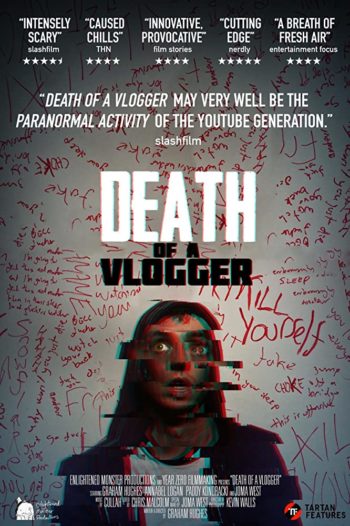
I bet by now you’re probably bored of reading features about found footage films that start with “this one’s different” – but trust me, this one actually is. Death of a Vlogger is micro-budget film that’s been receiving major praise from the horror community. And rightfully so – it’s scary, funny and incredibly timely: a definite contender for top 10 of the year so far. Telling the story of an ambitious video blogger, who thinks his house is haunted, it’s a fresh take on the genre and an interesting look at the Internet’s worst aspects. To celebrate its release, HorrorCultFilms web-called director/ writer/ lead actor Graham Hughes to talk about shaming, shooting on a shoestring and showing at festivals. Please note that, for clarity, the interview has been slightly edited and rearranged.
First things first – where did this idea come from?
It came from a couple of places. First, I’d been making videos for the Internet for a couple of years and I’d seen a horrible, increasing pattern, of just negativity. It’d become such a toxic place. Yet I’d still be sitting there, whenever I posted a video, clicking refresh – waiting for the views and likes to come in: a desire to see the validation. It wasn’t quite an obsession or addiction, but it was unhealthy anyway. Then I read Jon Ronson’s So You’ve Been Publicly Shamed.
Great book!
It clarified a lot of things I’d been thinking about the Internet but didn’t have the intelligence to put together myself. I just found it fascinating and horrifying in equal measure.
And you immediately thought horror was the right vehicle to explore this?
Yeah. I usually tend to start with a plot when I’m making films. However, more recently, I’ve been going with things that make me angry. I think that’s a good jumping-off point. If something makes you angry, then you’re clearly passionate about it. It also becomes easier to write about it because you’re taking it from a visceral place within yourself.
Given how tired many people have become of them, did you need to convince yourself to make a found footage?
Found footage films aren’t dead, but there are a lot of cynical people making them since they’re the easiest genre to do. So if you just want to make a movie, they’re so accessible. Matt Johnson’s The Dirties inspired the kind of approach I took. I don’t even know how I stumbled across that film. When I watched it, I was like, oh, wow.
I don’t know that one
It’s found footage, though not horror. It’s about two high school teenagers making a short film about school shootings for their class project. It’s shown as a kind of like fly on the wall of them making this film, but it doesn’t go down too well. Then one of the kids thinks that’s because it lacked reality so they start planning an actual school shooting. There are so many other amazing films too, like Lake Mungo and The Borderlands. So I think there’s still so much life left in this genre.
There’s something inherently interesting about you the character having your name in a film that plays with the audience’s ideas about realism. Is the character of Graham much like yourself?
He’s a caricature version of: he’s both a lot worse than me and a little better.
Presumably, bits like the prank videos at the start were genuine?
Yeah, I was lucky about how those parts all fell into place. The main reason that I cast myself is the pragmatic reason that I didn’t have any money. I hate asking for favours, and I’ve asked for favours for over a decade now. So if I can do anything to avoid asking someone to do something for free, then I’ll do it myself. It meant I also didn’t always have to go out to shoot something – I could just come home from work and film a scene, because it’s just me, my phone and a tripod for most of it. I’m not a trained actor, and I know my limits. But I could play this character since he’s quite heavily based on me and I’ve done vlogging before.
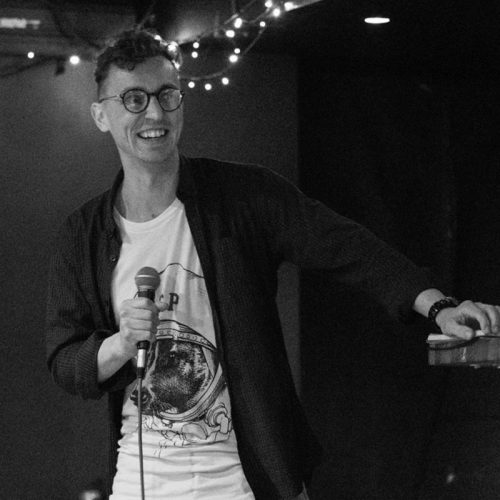
It shows. Like when you’re telling the story about paratroopers – it was really organic. Is that true?
It’s made up: it’s a story that my dad told me – he made the analogy when he was teaching me to drive, and we were coming off the motorway. He’d say I need to be careful because when you drop from 70 to 30, it’s going to feel like you’re crawling. He used the paratrooper’s story as an analogy for perspective – how we see small events being shaped by experiencing something bigger. I tried verifying it, but couldn’t. So it’s another layer of the film toying with whether or not it’s a true story. A lot of people will maybe take for granted that it is, which is such an internet thing: not doing the research.
Without going into if Graham actually dies, I assume the title was a play on Arthur Miller?
Yeah, it took a while to land on it since I struggled with the end for a while. The film was shot over six months, or thereabouts – just really piecemeal. The script changed as I shot more, and there were different endings. So the title came later. It was Followers for a while, but I realised there were about twenty others on IMDB.
Without saying too much, I really like the ambiguity surrounding Graham as it goes on.
I almost always prefer ambiguity – I love films that nail it. Like Rosemary’s Baby, until the last two minutes. I guess: you can just flip back and forth and say each interpretation is believable. I’m only realising this now I’m talking about it, but I guess that’s like how I wish the Internet was: more grey areas.
So once you had the story off the ground, how you go about funding this sort of movie?
It was from savings: there was very, very few people involved. The credits are only about ten names, and maybe about another ten who were extras. But there were very few outgoings. Like the flat in the film is my flat, I shot about 80% on my phone, and most of the actors are my friends – who were happy to help.
Then when shooting on locations, like derelict buildings, you just need to ask permission, right?
I think you’re supposed to…
(Laughs) And the pub?
That was The Flying Duck – it was 40 or 50 quid because we only shot for three hours. Then my friend, Kevin, shot the talking head parts and gave me mates’ rates. That was only two and a half days, so it was a few hundred quid. As I said, I’ve been really lucky with favours.
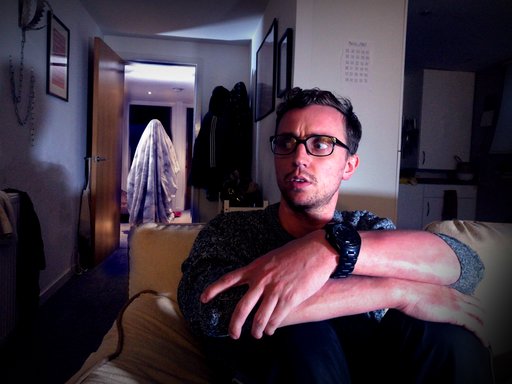
For tone, was it tough to balance the horror and comedy?
It’s been said before that horror and comedy go hand in hand. Structurally, they’re relying on a lot of the same mechanics, so I think they’re really good bedfellows. I don’t think I ever want to make a film that is entirely devoid of humour – it’s such a turnoff because, to get kind of wanky, life has humour. So even if you’ve got some sort of kitchen sink melodrama, there still needs to be that. Because even in their darkest times, people still find humour in stuff. Also, it’s a silly premise so it’d be stupid not to poke fun at this.
I guess it also makes the characters more likeable if you can laugh with or at them.
100% agree with that. Yeah. I mean Steve, the ghost-hunter, is a piece of shit. But he’s really funny so it warms you to him. He becomes like an antihero rather than a foil.
To help the comedy, did you encourage much improvisation on set?
It varied from actor to actor. Annabel Logan and Patrick O’Brien were absolute professionals on this and the last film – when they turned up, they had the script word for word. So I didn’t tend to ask them to improvise: they’re happy in that mode. Paddy Kondracki is a fantastic improviser, and I’m happy to let him do that. About half of his jokes in the film were improvised. There were dozens more when we’d just keep shooting stuff, and he’d be cracking me up – they had to be left on the floor because they were too funny for a horror.
You also tackle big subjects throughout. Like how social media impacts the brain, and then there’s a lot of stuff on mental health more broadly after the Internet turns on him.
Like I said, he’s an exaggerated caricature of myself. I’ve had those feelings before but, fortunately, I’ve never been on the end of an actual shaming. It must be horrendous. I think horror and sci-fi are the two best genres for exploring this sort of thing. For me anyway – I find straight dramas hard to engage with where they’re tackling an issue, and they’re po-faced. But with horror, you’re going to get a bit of entertainment along with the social commentary. I think it’s like such a suitable delivery mechanism for these sorts of things. And it’s easier to think about the message when they’re done.
It’s interesting that, once you’ve established the threat, it seems to get more personal as it goes on.
Oh, cool. That’s nice to hear. And I wonder if that’s maybe part of what I was saying earlier: I put it together it over a long time, and I didn’t get to the end ’til late, so maybe I had a more personal connection to it by then. It’s a peculiar way of putting it together. I’ve never made a film like that before.
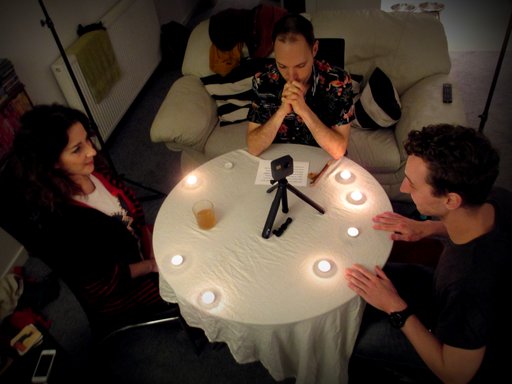
How much did it resemble the script you originally wrote?
It was pretty similar. I’d written about 60 pages plus a rough kind of plan for where it’d go. I completed it maybe halfway through shooting. So it, and the footage I already had, informed each other in many ways. I was hoping it would be something like the Pixar method: where they look at things on a micro-level, even shot by shot, to see what’s working and what’s not. It’s easy for them to get actors back into the voice over booth and changes lines. That’s probably why their quality is so good – they’re able to like see what they’re making as they’re making it and change it.
Once you had it made, how was getting it on to the festival circuit?
Oh, impossible. Thank God for Ian Rattray, and the other guys at FrightFest, because without them I don’t think this film would be where it is just now. I’d probably have ended up just chucking it on Amazon myself. FrightFest was among the few people that took a chance on this film. We’ve played it to two other film festivals, and one of those played my last one: A Practical Guide to a Spectacular Suicide. They all program a lot of films, so it was nerve-wracking wondering if anyone was going to turn up.
Were you checking updates a lot?
Yeah, you can see the seating plan on the run-up to it, which was not good for my mental health. Every day I was able to see how many tickets were sold, which was horrible. But they’re great – I love film festivals.
It must have been cool seeing it go from your phone to a screen in your home city.
Yeah – that was the first time I’ve had a film play at the Glasgow Film Theatre. They put the poster up in the foyer, and it was surreal just being able to see my face at the GFT after going for over a decade. That was a beautiful moment.
I take it you were following the tweets a bit?
Yeah – if that wasn’t clear from what I’ve been saying (Laughs) I’d be refreshing to see what came up, and what different bloggers or websites were saying.
You’ll be doing that even more, as this gets released on the sixth of July – where can people see it?
It’s available on Amazon, Sky Store and iTunes
Finally, do you know what’s happening next for you?
I don’t know. I’ve got a lot of ideas, and one I’m working on at the moment that could be the next feature – but I’m quite flighty. I was even looking at a crime thriller for a while, with small action elements. At the moment it’s another paranormal horror – if I don’t change my mind by the end of the week. I’ll probably just do the same again: a micro-budget feature. But the plan is everyone will get paid this time!
Death of a Vlogger is released on VOD on 06/07/20. You can read my review here.


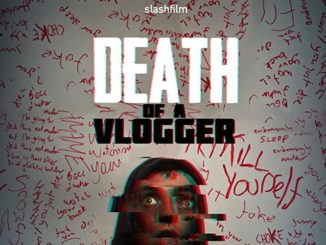
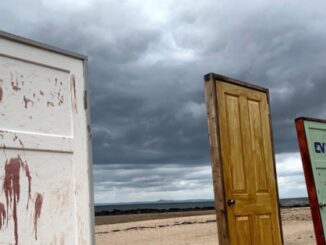
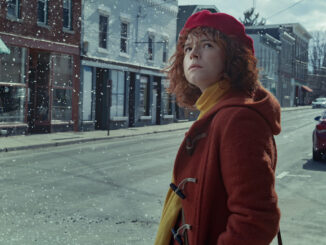
Be the first to comment